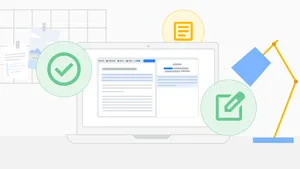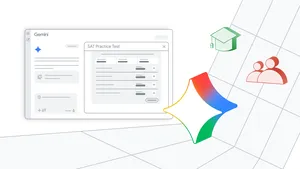Exploring the future of education with experts around the world

Students and teachers around the world have returned to the classroom, and the familiar signs of school are back: hallways are full, as are social calendars. But a lot has changed, too. Overcoming the challenges of the last few years meant that leaders and educators had to do things differently — and quickly. As the world continues to evolve, driven in part by pressing global issues and the accelerated rate of technological innovation, what should the role of education be, and how might it look?
To begin to answer this question, Google for Education collaborated with research partner Canvas8 and advisor and consultant American Institutes for Research to conduct a global study in 24 countries. Our report uses 94 educational expert interviews, two years of peer-reviewed academic literature and a media narrative analysis across the education sector.
The result is a three-part report on the future of education that brings together a diversity of perspectives from policy experts, academic researchers, district-level representatives, school principals, teachers and education technology leaders. Today we launched Part 1: Preparing for a new future, which discusses the role education plays in equipping students with the skills and mindsets they’ll need to navigate massive change.
We discuss three key trends:
- There’s a rising demand for global problem solvers. As the world faces a new set of global challenges, such as equitable access to education, digital literacy, sustainability and economic volatility, education systems will become a central part of the solution, helping future generations embrace global mindsets and skill sets.
- The skill sets required for work will change. As technology advances, education will focus on equipping students with the high-demand skills they’ll need to thrive in a new world of work.
- We must shift to a lifelong learning mindset. As lifespans increase and societal change accelerates, the idea of lifelong learning is gaining traction, with more tools available for developing skills and advancement.
To hear directly from some of the experts who informed this report, check out Teaching for tomorrow, a new series on the Google for Education YouTube channel. We kick off with the series trailer and insights from Tony Wagner, Ed.D., Senior Research Fellow at the Learning Policy Institute and Jan Owen, Co-chair of Learning Creates Australia. They discuss topics like the future of work, education technology and moving education beyond the classroom.
With the Future of Education, we aim to provide educators and education leaders with insight into the trends shaping the future, and to spark ideas and discussion on how we can work together to help all learners — and those who help them — succeed.
Visit edu.google.com/future-of-education to read Part 1 and preview Parts 2 and 3: Evolving how we teach and learn and Reimagining learning ecosystems.







